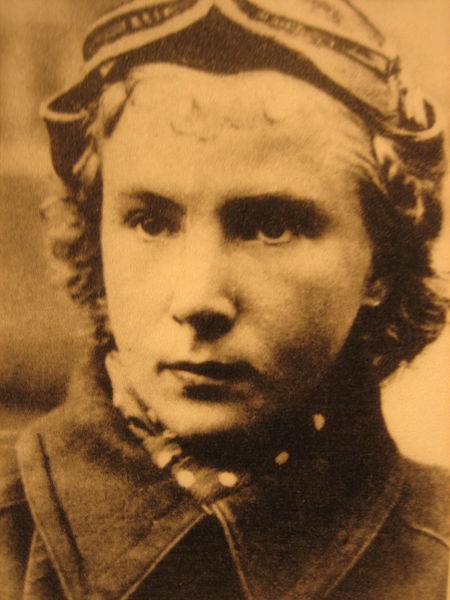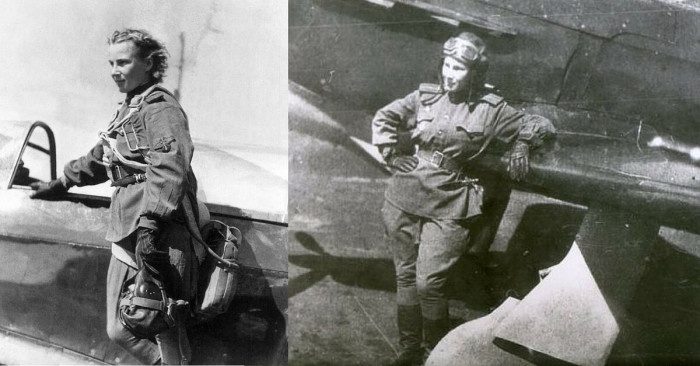Lydia
Litvyak was a Soviet flight instructor who had trained 45 pilots by the
time the Germans invaded the Soviet Union. She began flying when she
was 14 and performed her first solo flight at 15. Of course when
Barbarossa broke out and the massive Wehrmacht was making its way into
the interior of the country, she tried to fly for the Soviet Air Force.
After
being turned down several times she eventually was allowed into the
586th Fighter Regiment, the famed Soviet all-female regiment formed by
Marina Raskova. She began training on the Yak-1, the Soviet’s scrappy
but reliable small single seat fighter.
She was called the “the White Rose of Stalingrad”, or the White Lily.
During
her combat dories, she claimed 14 kills give or take a few that may be
in dispute. It is not in dispute that she was an aggressive and highly
skilled aviator who was obsessed with flying and fighting the invading
Nazis. She claimed several Me-109s and Focke Wolfe 190s and Junkers 87
Dive Bombers.
Litvyak flew her first
combat flights in the summer of 1942 over Saratov. In September, she
was assigned to the 437 IAP, a men’s regiment fighting over
Stalingrad. In the 437th Fighter Regiment, Litvyak scored her first two
kills on 13 September, three days after her arrival and on her third
mission to cover Stalingrad, becoming the first woman fighter pilot to
shoot down an enemy aircraft.
She
shot down Staff Sergeant Erwin Maier, another German ace. He parachuted
down and was taken prisoner. He asked to see if it was true that he was
shot down by a woman and he was allowed to meet her. He could not
believe he was shot down by a female pilot and only when she accurately
described all the maneuvers in the flight and knew it was true.
Twice she crash landed and once she was hit and wounded in her plane and lost a lot of blood on the way down.
On
August 1, 1943, Lydia did not come back to her base of Krasnyy Luch, in
the Donbass, Ukraine, from an escort to a flight of Ilyushin Il-2
Shturmoviks. It was her fourth sortie of the day. As the Soviets were
returning to base near Orel, a pair of Bf 109 fighters dived on Lydia
while she was attacking a large group of German bombers.

Soviet
pilot Ivan Borisenko recalled: “Lily just didn’t see the Messerschmitt
109s flying cover for the German bombers. A pair of them dived on her
and when she did see them she turned to meet them. Then they all
disappeared behind a cloud.”
Borisenko,
involved in the dogfight, saw her a last time, through a gap in the
clouds, her Yak-1 pouring smoke and pursued by as many as eight Bf 109s.
Borisenko descended to see if he could find her. No parachute was seen,
and no explosion, yet she never returned from the mission. Litvyak was
21 years old.
Soviet
authorities suspected that she might have been captured, a possibility
that prevented them from awarding her the title of Hero of the Soviet
Union.
Two German pilots are
believed to have shot down Litvyak: Feldwebel Hans-Jörg Merkle of
1./JG.52 and Leutnant Hans Schleef, of 7./JG 3. Merkle is the only pilot
that claimed a Yak-1 on Dmitryevka (where she was last seen and was –
reportedly – buried), on 1 August 1943, while Schleef claimed a LaGG-3
(often confused in combat with Yak-1s by German pilots) on the same day,
in the South-Ukraine area where Litvyak’s aircraft was at last found.
In
an attempt to prove that Litvyak had not been taken captive,
Pasportnikova embarked on a 36-year search for the Yakovlev Yak-1 crash
site assisted by the public and the media. For three years she was
joined by relatives who together combed the most likely areas with a
metal detector.
In
1979, after uncovering more than 90 other crash sites, 30 aircraft and
many lost pilots killed in action, “the searchers discovered that an
unidentified woman pilot had been buried in the village of Dmitrievka…
in Shakhterski district.”
It was
then assumed that it was Litvyak and that she had been killed in action
after sustaining a mortal head wound. Pasportnikova said that a
specialist commission was formed to inspect the exhumed body and it
concluded the remains were those of Litvyak.
On May 6, 1990, USSR President Mikhail Gorbachev posthumously awarded Litvyak Hero of the Soviet Union


Δεν υπάρχουν σχόλια:
Δημοσίευση σχολίου